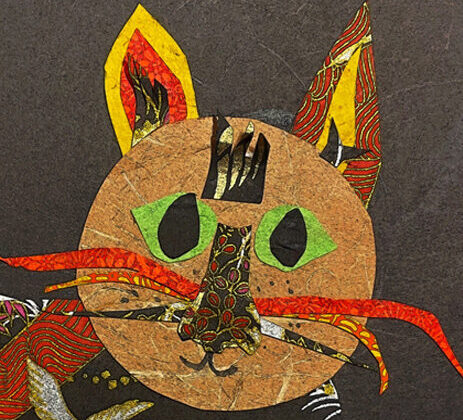Ray Rasmussen
The Many Huts of a Phantom Guest
I gave up city life some years ago, and now approaching 50,
I’m like a bagworm that’s lost its bag, a snail without its shell.
~ Matsuo Basho, Hut of the Phantom Dwelling
Several years ago, I sold the home I lived in for 40 years with my wife, two daughters, four dogs and five cats (not all at the same time). Since selling, I’ve become a nomad, either staying with friends or tenting at campgrounds or lodging in the sterility of a motel.
I liken myself more to a hermit crab than to Basho’s bagworm or snail. At the beaches of my childhood, I would cradle the little crabs in my hands and patiently wait for them to poke out their heads and legs and scrabble across my palm.
In my reclusive scrabblings, while driving the 5,500 km shore-to-shore of Canada’s vastness, memories I’m reluctant to share flood in, some joyful, many regretful, some despairing. Just a few weeks ago . .
as I stood alone
on the beach at Old Woman Bay
I took in the oceanic expanse of Lake Superior
that severs me so
from friends and home
~ modeled after a poem by Matsuo Basho

Hermit crabs keep their soft body parts inside their shells and, when threatened, pull head and legs back in. In similar vein, I hold these darker musings deep within my human shell, moods I identify with T.S. Eliot’s . . .
pair of ragged claws
scuttling across the floors
of silent seas
Ragged, yes, and I sometimes feel, well . . . crabby, complaining, depressed, self-pitying, as in: How did I get to be so damn old! and Is this effing rain ever going to stop!! and What am I doing acting as if, like Basho, I’m about to write something worth reading about this late stage of my life’s journey?
On his travels, Basho was often a guest in the homes of fellow poets sharing renku sessions. I’m sometimes welcomed as a guest in friends’ homes, for companionship, if not poetry, and out of my host’s concern (is it also pity?) for me in my self-imposed nomadic flight.
Guesthood can be a warm experience, but it can grow stale, both for host and guest. As one pundit put it, “The first day one is a guest, the second a burden, and the third a pest.” When my stay is longer than a few days, I’d like to think that the hosts experience my presence as a welcome diversion, and, hopefully never as a pest, but how is one to know?
On their part, my well-meaning benefactors can be overly helpful, wanting to show me the sights, inviting me to dinners with their friends, people who are apt to say things like “Must be wonderful to be on a permanent vacation” or ask, “What are the top five on your bucket list?” And how can I say “No, thanks” when my hosts offer up so many rich, fat-inducing, albeit delicious meals!
I grow old, I grow old . . .
they will say: “how his hair
is growing thin!”
~ T.S. Eliot
How do I tell these well-meaning interrogators that camping and guesthood can be less than pleasant, that it’s not like being on a wondrous travel junket enjoying ‘seeing the world’? And I’m reluctant to share that I too-often receive visits from . . .
the eternal Footman
(who) holds my coat,
and snickers.
~ T.S. Eliot
At times I feel a need for complete privacy. This morning, I’m enjoying aloneness (and yes, coupled with loneliness) at a friend’s lakeside cottage (bless her!). In contrast to rough camping, the cottage is a full-works shelter containing comfy chairs, tables and bed, a music system, full kitchen and a bathroom with shower.
the warming touch
of a fire at day’s end –
something to count on
~ after Basho's haiku below
among these summer trees,
a pasania—
something to count on
~ Basho, The Hut of the Phantom Dwelling
Later, sitting on a deck with a screened porch, sipping tea and munching biscuits, the sun slowly sets on Harp Lake while a swarm of whining mosquitoes try (and thankfully fail) to join me for (their) meal. A tiny house wren sings his evening aubade while his mate sits on the eggs. The wrens seem not to mind me living so near. I like to think that their chirring songs are welcoming, but it’s more likely they’re issuing warnings to stay on my side of the screen.
sheltering on the
other side of a screen –
no Internet, TV or e-mail
There is human company of sorts. I’m reading T.S. Eliot’s “The Love Song of J. Alfred Prufrock” and Matsuo Basho’s journals. Exhausted by his travels, Basho retired to a crude hut (no warm baths or mosquito screens there!) where he wrote his renowned journals in a style that became the initial model for contemporary English-language haibun. These became poetic statements of his ideals as a recluse:
“. . . I’m not really the kind who is so completely enamoured of solitude that he must hide every trace of himself away in the mountains and wilds. It’s just that, troubled by frequent illness and weary of dealing with people, I’ve come to dislike society.”
At this stage of my life, travel to new places has lost its allure, is physically tiring, psychologically draining and I often feel lonely even when in a campground circle of strangers for a greet-and-meet chat.
Rest Haven RV Park
a circle of seniors sharing
beer and tired jokes
While I do miss friends and family, like Basho, I am happy to do without what he disparagingly calls “the society of mankind.” In my case, that includes today’s appalling news stories; the deluge of ads showcasing happy-go-lucky youngsters who seems not to be so happy these days; the grinding roar of traffic in cities; host shows with guests and moderators performing in-the-know gab; self-seeking, ever-lying politicians: and, even chats with friends that too often focus on the infirmities that accompany aging.
You grew old,
you grew old,
Mr. Eliot
as have I,
so I’m told
During his period of solitary life, Basho also wrote:
“ . . . in the end, unskilled and talentless as I am, I give myself wholly to this one concern, poetry.”
What I would give to be as untalented and unskilled as Basho! Still, with the talent and skills I possess, here I am, alone but for the mosquitoes and wrens, putting my energy into writing memoirs in the form Basho initiated so many years ago.
smoke drifting upward
the whispering ghosts
of Eliot and Basho
And all too often, I muse on this: If I dislike society, who then am I scribbling for?
Put simply, I want to maintain relationships with family, friends and fellow writers.
And isn’t that sufficient?
Alas, it too often seems to cause concern about my nomadic life.
For us to ponder, Basho ends his haibun with:
“And yet we all in the end live, do we not, in a phantom dwelling?”
Notes:
Most quotes of Basho are taken from various translations of Hut of the Phantom Dwelling, Translation by Burton Watson.
If you’ve not read the Japanese Master’s journals, I recommend you read Burton Watson’s translation of Hut of the Phantom Dwelling online and the commentary on the Hermitary website.
Burton Watson, often cited as one of the best translators of Chinese and Japanese sources, indicates in his preface that these narratives about dwellings and the sort of life lived in them convey not merely diurnal trivia but an “underlying sense of the world and what is to be valued in it.”
Most quotes of Eliot contain slight modifications of his poetic passages in “The Lovesong of J. Alfred Prufrock.” If you’ve not read Eliot’s “Prufrock,” I recommend you download the poem and go to Jeremy Iron’s reading on youtube. Rather than try to understand the poem in part or whole, simply relax and let Jeremy Iron’s luxurious reading voice flow past your closed eyes and into your ears.
Basho’s poem used as a model:
as I stand alone
on the beach of Narumi,
1 feel the expanse of the sea
that severs me so
from the ancient capital
About the Author

Ray Rasmussen is on the road camping or staying as a guest in various parts Canada and the United States. If you invite him to visit, he may show up and will likely offer to share a renku session. His haibun, haiga, haiku and articles have been widely published and anthologized. Ray’s Blog is “All Things Haibun” and his haiku-genres website is “Haiku, Haibun & Haiga.” Ray currently serves as cho’s Encore Editor.

Ray. We live in Vermont and would enjoy some Haibun schooling as I hope to write a Haibun novel, or at least a novel Haibun. You could visit for three days if you wish on your nomadic journey. We have hot tea and a shower.
Hi Bill, Nice offer, right now I”m in Ontario for the fall colours which you must be having too, and yes I’m guesting, but not much more travel this year before I return to guesting in Edmonton, Alberta. So maybe a visit via the internet? We could even do a zoom at some point. ~Ray